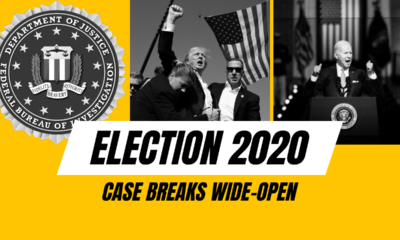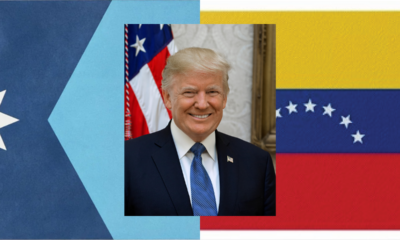Constitution
Government strenuously defending censorship
Government at all levels – federal, State, county and municipal – seems to be defending censorship as strenuously as possible.
Government officials at many levels are filing a slew of alarming friend-of-the-court briefs in support of continued social media censorship. All these briefs amount to special pleading for privileged positions, by virtue either of the offices some of these “friends” hold, or the particular concerns of the issues at hand. Jonathan Turley, a commentator on constitutional law, alerted readers to one of the briefs. But friends of free speech should also take alarm at two of the others.
The government doesn’t trust you anymore, if it ever did
The United States government – or elements of it that outsiders call The Deep State – clearly fear the people. For that reason, it does not want the people to speak freely about political issues of the day. And they certainly do not want anyone casting suspicion on their activities. So we saw social media turning into State actors – and willingly, too. Evidently the heads of these media needed no persuasion, as Andrew Torba at Gab Social has pointed out.
The Attorneys General of Missouri and Louisiana, together with a handful of alternative-media platform directors and medical practitioners that had run afoul of this “thought police,” filed their landmark lawsuit, Missouri v. Biden. They filed their case in Monroe, Louisiana, but the government has appealed it twice. They have appealed to the Fifth Circuit, and lately to the Supreme Court. These appeals come after Judge Terry A. Doughty issued a massive preliminary injunction against all social media censorship activities. (See CourtListener’s docket listings at the District Court and Appeals Court levels. See also two Supreme Court docket listings, for the application for stay, and for a petition for review.)
The Supreme Court has stayed the Big Injunction in its entirety and is now receiving friend-of-the-court briefs. (Technically, courts call these “briefs amicus curiae,” from a Latin phrase literally meaning “friend of the curia.” The Latin curia, once standing for a meeting place of the Senate of Rome, today stands for a court.)
Nature of the briefs
At time of posting, the Supreme Court has received fifteen such briefs. Many of these are “in support of neither party.” These briefs fall into the following broad categories:
- Excusing the conduct of the social media platforms themselves, because “the government made them do it.”
- Asserting that the courts lack jurisdiction over the private conduct of private moderators, curators, and editors.
- Saying government censorship is right and proper, because the respondents demand the freedom to commit actionable fraud. Not only is this fraud actionable, but it also poses a clear and present threat to public health. This is the official position of the American Academy of Pediatrics.
- Seeking to preserve the “editorial freedom” of social media platforms in their role as elements of the press.
- Asserting that State and local governments have reason to censor as well.
- Complaining about “election mis- and disinformation.”
- Suggesting that to enjoin the government from communicating with social-media companies might impair “independent technology research.”
These briefs come from parties, other than actual government officials, trying to carve out special protections for their own interests. In addition, Stanford University, the parent of several projects at the heart of the Missouri controversy, filed its own friend-of-the-court brief. They held that the respondents had lied about them, and about the “independent research” they were doing. In short their brief defends the Election Integrity Partnership, the Virality Project, and the Stanford Internet Observatory. (America First Legal is also suing EIP and VP.)
Government actors filing briefs
In contrast, the briefs that concern us today come from actual government officials trying to preserve an authority to censor. In this context, Sen. Mark Warner (D-Va.) rates a “dishonorable mention.” He briefed the Court to sound Chicken Little-like alarms about “foreign malign influence over social media.” in other words, to paraphrase a famous Sixties-era motion-picture title:
The Russians Are Coming! The Russians Are Coming!
In fact Sen. Warner specifically cited Robert Mueller’s indictment against a Russian-affiliated company, and several Russia Bogeyman “reports.”
But Jonathan Turley took alarm at a different brief: the New York Brief.
The State of New York held that States have a power and duty to prevent the “spread of harmful content.” Twenty-one other States, and the District of Columbia, signed on to this brief.
The brief defines “harmful content” far too broadly. In its Interests section, it directly conflates:
- Protection of minors “against online predators, inappropriate conduct, and cyberbullying” and institution of parental controls, with:
- Sharing of raw footage from mass-shooting events, every one of which becomes an excuse for more gun control.
As Amici States’ experience confirms, maintaining open lines of communication between the government and social-media companies on topics such as extremist violence, child safety, and consumer protection is mutually beneficial, furthers the public interest, and fully comports with the First Amendment.
Mutually beneficial, that is, to the government (apart from the people) and social media moderators acting like bullies.
Distinctions without differences
The New York Brief makes two distinctions without differences. First, it tries to distinguish between persuasion and coercion. In fact, “persuasion” is a euphemism for “coercion.” “It would be a shame if such-a-dire-thing happened to this person/project whom/that you love” sounds persuasive but is actually coercive. (In fact, counsel for the Missouri plaintiff/respondents have used that precise metaphor in their own briefs, from time to time.) Likewise, “you wouldn’t want such-a-thing to happen to such-a-type-of-person, would you?” is another coercive trope masquerading as persuasion. It assigns moral responsibility where none actually exists, or it precedes a policy solution that will not actually address any problem that might exist.
Second, the brief tries to distinguish between the existence of governmental authority, and its actual exercise. That distinction is never important. The mere display of a weapon is often sufficient to deter a criminal act – or to command obedience to a law-enforcement officer in the lawful exercise of his duty and authority. Any LEO knows this – and so does any lawyer. “Brandishing” is also a way a criminal commonly compels his target to cooperate with him.
When any authority exists, a court must ask whether the exercise of that authority, in any context, is lawful. The mere existence of an authority is equivalent to an LEO brandishing his service gun or other weapon.
How to address actual harms
To address the harm-to-minors problem, why permit minors to use social media? If it’s that dangerous, make the medium for adults only, and have done with it!
Furthermore, certain kinds of communication are unlawful on their face anyway. Telephone directories, regrettably obsolete today, once had the most helpful advice possible for anyone receiving malicious, annoying, or threatening communications. “Just hang up,” they advised anyone receiving “annoyance calls.” If that didn’t work or if the caller issued threats (credible or not), the recipient could call the police.
Teachers, pastors, and any other persons who counsel minors in dealing with social challenges need to teach a practical philosophy. Those who bully others with mere words (apart from violent acts or threats) rely on their targets caring what others think. One who doesn’t care, is not subject to verbal bullying – it simply does not work. Teaching minors not to care, and how not to care, would eliminate cyberbullying as a problem.
Existing law already covers such harms as “revenge pornography” and anything else that involves the sharing of information, the owner of which had a reasonable expectation of privacy. But that law also relies on some time-honored advice few parents seem willing to give anymore. “Don’t talk to strangers” had a sound basis, and that basis still holds. Furthermore, many adolescents tend to share too much, thus making themselves vulnerable. Aside from making social media participation adults-only, parents (and teachers) should teach responsible use of social media.
New York denies the exercise of authority
The New York brief, from the beginning, proposes to excuse all government communication as a mere sharing of information. Nowhere, the brief argues, did anyone give a direct order. CNAV has already explained why that’s a distinction without a difference. New York compounds its problem by referring to its own “broad regulatory and law-enforcement authority.” Maybe the breadth of this authority, is the problem.
The brief refers repeatedly to “nonbinding guidance.” But when does guidance from an entity that can shut you down, not bind you to do as they say?
“A government entity has the right to ‘speak for itself,’” they say. Fine – so if the government has anything to say, let the government post it publicly. Posts for public consumption were never at issue, and still aren’t. Not one plaintiff has ever said the government may not have a channel of communication with the public. (CNAV has not read any suggestion to discontinue the Emergency Alert System, for example.) But the government telling certain companies that some of their accountholders are trying to defraud the public, is at issue. If actionable fraud is an actual threat, let the government prosecute. They don’t prosecute because they know they’d lose. Not only is “truth… a complete defense,” but even lies require actual malice or deceptive intent to be prosecutable.
An example
A post saying, “See how vaccines have saved countless lives” would always be appropriate. It would also give the people a chance to check the government’s facts. Then, if necessary, they could reply to the post, saying things like:
- Can you answer such-a-person’s concern that, we feel, you have not adequately addressed? Or:
- We challenge you to a debate of such-a-resolution.
CNAV is sure that Contributors John Anthony, Bradlee Dean, and others would welcome the opportunity to engage directly with, say, Surgeon General Vivek Murthy (the named Supreme Court petitioner), former “Doctors’ Doctor” Anthony S. Fauci, M.D., or the head of the American Academy of Pediatrics on the question of vaccine safety and effectiveness. So why didn’t Dr. Fauci ever make himself available for such discourse while he held public office? Why won’t Dr. Murthy do the same now? Why won’t the American Academy of Pediatrics send a representative to address issues that properly concern every parent today? What do they actually fear? They say they fear the public harm from people not taking their advice. But maybe they actually fear exposure of themselves, for telling, or merely repeating, a pack of lies.
One does not win a debate by restraining another, a priori, from offering an opposing argument. To those who insist, “Vaccine safety and effectiveness are not debatable,” CNAV says: Get off your high horse and debate, or we will take our business elsewhere! That, is what they fear.
Open disclosure? Not!
The New York Brief also speaks of “open disclosure.” Again, if the government wants to disclose anything, let the government post it. But the government is not interested in open disclosure. They are interested in preventing the disclosure of information contrary to their narratives.
When the New York brief discusses assistance to social media companies in enforcing their own policies, they tell two lies. First they conveniently fail to mention that some of the conduct at issue, brought about changes in moderation policies. Those changes would not have occurred, absent the government’s “significant encouragement.”
Second, to the extent that any moderation team needed no persuasion, the New York brief has just given the customers of the company in question, another reason to decamp from that medium. They’ll go to Gab Social, or Rumble, or maybe to X, if Elon Musk roots out the troublemakers.
As a specific example, the New York brief cites the Buffalo Shooting. The shooter (since L-WOPPed) said he wanted to kill those of a different race than himself. He then “streamed” his act with video shot from his point of view, and offered a “manifesto.” First, New York is still a may-issue State (in defiance of New York State Rifle and Pistol Association v. Bruen). Had those Buffalo store patrons been armed, we’d be having a different conversation. Second, the “content” need not “harm,” if viewers don’t care. (See above.) Some of that content might provide vital clues. But that’s not good enough for “Nanny State.”
Other government briefs
Twenty-one other States, and the District of Columbia, signed onto the New York brief. Jonathan Turley listed them all: Arizona, California, Colorado, Connecticut, Delaware, Hawaii, Illinois, Maine, Maryland, Massachusetts, Michigan, Minnesota, Nevada, New Jersey, New Mexico, Oregon, Pennsylvania, Rhode Island, Vermont, Washington, Wisconsin and District of Columbia.
The Supreme Court has received two other briefs along this same line. Secretaries of State of Arizona, Colorado, Connecticut, Maine, Minnesota, New Mexico, Oregon and Vermont submitted one – the SoS Brief.
The Court also received an Election Officials Brief from a smattering of current and former Secretaries of State and county or municipal election clerks and commissioners. They represent the States of Pennsylvania, Virginia, California, Kentucky, New Jersey, and Michigan, or governmental subunits of those States.
Those two briefs addressed alleged election fraud consisting of outlandish rumors about how elections actually run. Some of the rumors defy common sense, so people should easily recognize them as false. Beyond that, the government can easily post its own information, and share with the public the addresses of “official accounts.” Again, direct communication with the public was never at issue. Restraining others from communicating with the public, was and is.
Ronald Reagan famously said,
The nine most terrifying words in the English language are “I’m from the government, and I’m here to help.”
He might – or might not – have been paraphrasing Sen. Edmund S. Muskie (D-Maine). But the sentiment is still valid. So is this one: Among the most terrifying words in the English language are these: I’m from the government, and I don’t think you should listen to this.
Terry A. Hurlbut has been a student of politics, philosophy, and science for more than 35 years. He is a graduate of Yale College and has served as a physician-level laboratory administrator in a 250-bed community hospital. He also is a serious student of the Bible, is conversant in its two primary original languages, and has followed the creation-science movement closely since 1993.
-

 Civilization2 days ago
Civilization2 days agoWhy Europe Shouldn’t Be Upset at Trump’s Venezuelan Actions
-

 Accountability5 days ago
Accountability5 days agoWaste of the Day: Principal Bought Lobster with School Funds
-

 Executive3 days ago
Executive3 days agoHow Relaxed COVID-Era Rules Fueled Minnesota’s Biggest Scam
-

 Constitution4 days ago
Constitution4 days agoTrump, Canada, and the Constitutional Problem Beneath the Bridge
-

 Christianity Today2 days ago
Christianity Today2 days agoSurprising Revival: Gen Z Men & Highly Educated Lead Return to Religion
-

 Civilization3 days ago
Civilization3 days agoThe End of Purple States and Competitive Districts
-

 Executive3 days ago
Executive3 days agoWaste of the Day: Can You Hear Me Now?
-

 Executive4 days ago
Executive4 days agoWaste of the Day: States Spent Welfare in “Crazy Ways”














